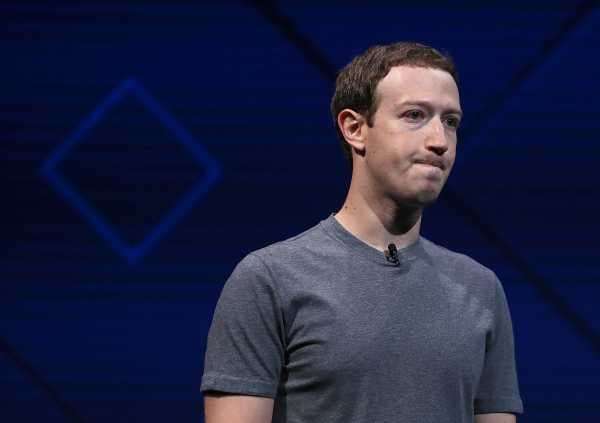
Lawmakers and regulators across the US and Europe are calling for investigations into Facebook amid revelations that personal data from 50 million of the social media giant’s users was secretly harvested by a data analytics firm that worked on the Trump campaign.
The public outcry over the data breach, which includes demands that Facebook founder and CEO Mark Zuckerberg testify before Congress, could spark new calls for the government to monitor privacy rules and political advertising on the social media network. The company’s shares, meanwhile, are in free fall, with the company losing $40 billion in market value since Friday and wiping away billions of dollars of Zuckerberg’s personal fortune.
The chaos surrounding Facebook deepened when news emerged on Monday that Alex Stamos, Facebook’s chief information security officer, plans to leave the company in August after disagreeing with his employer about how to handle Facebook’s role in spreading disinformation online. In particular, he has sought to make the company more transparent about issues like Russian use of the platform for political advertising — but received hard pushback internally.
US lawmakers in both parties are calling for investigations, and Democrats appear to be homing in aggressively on Zuckerberg in their criticism.
“They say ‘trust us,’ but Mark Zuckerberg needs to testify before the Senate Judiciary Committee about what Facebook knew about misusing data from 50 million Americans in order to target political advertising and manipulate voters,” Sen. Amy Klobuchar (D-MN) said in a statement.
Sen. Ron Wyden (D-OR) sent a letter to Zuckerberg on Monday demanding that Facebook list every instance in the past 10 years in which a third-party company violated Facebook’s privacy rules while collecting data on users.
Top UK regulator Elizabeth Denham has announced an investigation into the legality of the Facebook data breach. And Antonio Tajani, the head of the European Parliament, said the allegations against Facebook, if true, would mark “an unacceptable violation of our citizens’ privacy rights” and called for the European Parliament to conduct a full investigation.
The political and financial blows to the company began after the New York Times and the UK’s Observer published blockbuster reports over the weekend showing that the analytics firm Cambridge Analytica secretly obtained the personal data of millions of Facebook users. In 2014, the firm worked with Aleksandr Kogan, a scholar at Cambridge University, to administer a personality test through a Facebook app in which users agreed to allow their personal information to be collected.
But it turned out that this app didn’t just scrape the personal data of the roughly 270,000 users who agreed to take the personality quiz. It also scraped info from the friends of people who took it. That, in turn, meant tens of millions of Facebook users had their data collected without their permission or knowledge.
That privacy breach may have had significant political effects. The Trump campaign hired Cambridge Analytica in June 2016. It’s unclear at the moment if Cambridge Analytica made direct use of the secretly harvested data for Trump’s campaign, but according to the Times, the data was used for “developing techniques that underpinned its work” on the campaign. Cambridge Analytica also worked with the British political operation that successfully campaigned for the UK to leave the European Union in the 2016 “Brexit” referendum.
The possibility that millions of people’s personal data could’ve been used to influence such important political events has laid bare how consequential data breaches of this scale can be. And it could strengthen arguments saying that Facebook can’t be trusted to protect user privacy all by itself.
Facebook failed to crack down on Cambridge Analytica’s data mining
Cambridge Analytica specializes in what’s called “psychographic” profiling, meaning it uses data collected online to create personality profiles for voters. It then takes that information and targets individuals with specifically tailored political advertising. Access to the personal data of millions of Facebook users would be hugely valuable to the firm.
“We exploited Facebook to harvest millions of people’s profiles. And built models to exploit what we knew about them and target their inner demons. That was the basis the entire company was built on,” Christopher Wylie, the former Cambridge Analytica employee who went public about the data breach, told the Observer.
Facebook found out about Cambridge Analytica’s breach in 2015, but it didn’t notify users who had their data taken without their permission. And it didn’t take particularly strong measures to correct the leak, which is one of the largest in the company’s history.
Facebook lawyers sent a letter to Cambridge Analytica in August 2016 asking them to destroy any data they held that they had sucked up from Facebook without permission, but Facebook never followed up or made any attempts to confirm that Cambridge had actually done so with investigations. Only on Monday, years after learning of the breach, and days after the emergence of these explosive reports, did Facebook announce that it would conduct an audit of Cambridge Analytica to see if it actually got rid of the data.
Cambridge Analytica said on Saturday that it did not hold on to the data that was extracted without consent and that it did not use it for political operations. But copies of the data extracted by Cambridge Analytica exist to this day, according to the Times, whose reporters had access to raw data from the breach.
Cambridge Analytica had big ties with Trumpworld: Robert Mercer, a hedge fund billionaire and conservative political donor, owns the data firm, and Steve Bannon — the man who would become Trump’s campaign manager in 2016 — was a vice president there at the time of the breach.
Governments want to hold Facebook accountable
Now regulators and policymakers in the US and abroad are furious with Facebook and calling for investigations into just what happened.
Rep. Adam Schiff of California, the top Democrat on the House Intelligence Committee, told the Washington Post that Zuckerberg and other tech executives need to publicly answer about what went wrong.
“I think it would be beneficial to have him come testify before the appropriate oversight committees, and not just Mark but the other CEOs of the other major companies that operate in this space,” Schiff said.
Two former Federal Trade Commission employees told the Washington Post that Facebook could be fined for billions of dollars for violating a 2011 agreement it formed with the FTC over user privacy. Wyden’s letter to Zuckerberg asks him for a copy of every Facebook privacy assessment written since that 2011 agreement.
Republicans have also suggested that they’re open hearings.
“People have to look into it. Whether or not it broke the law, absolutely, the privacy of the American consumer, the American individual, should be protected,” Sen. Rand Paul (R-KY) said on CNN on Sunday.
In the US, the public backlash against Facebook could provide a boost for bipartisan legislation such as the Honest Ads Act, which calls for the government to regulate online political advertising the same way it does television, radio, and print advertising. It would require tech giants like Facebook, Google, and Twitter to keep data on anyone who spends more than $500 in political advertising on their platform. Among other things, the companies would be expected to keep copies of the advertisements and information about the organizations that purchased them.
“This is more evidence that the online political advertising market is essentially the Wild West,” Sen. Mark Warner (D-VA), one of the sponsors of the bill, said in a statement on Saturday. “Whether it’s allowing Russians to purchase political ads, or extensive micro-targeting based on ill-gotten user data, it’s clear that, left unregulated, this market will continue to be prone to deception and lacking in transparency.”
Over in the UK, Facebook faces mounting pressure as well. British Prime Minister Theresa May’s spokesperson called the allegations “very concerning” and backed Denham’s call for an investigation. And British MP Damian Collins said he would call Zuckerberg and the head of Cambridge Analytica, Alexander Nix, to testify before Parliament.
It looks like Zuckerberg is in for a rough ride.
Sourse: vox.com






